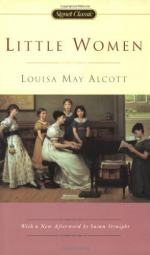“We are prepared,” said Mrs. March, smiling but looking a little anxious.
“I told you they dressed me up, but I didn’t tell you that they powdered and squeezed and frizzled, and made me look like a fashion-plate. Laurie thought I wasn’t proper. I know he did, though he didn’t say so, and one man called me ‘a doll’. I knew it was silly, but they flattered me and said I was a beauty, and quantities of nonsense, so I let them make a fool of me.”
“Is that all?” asked Jo, as Mrs. March looked silently at the downcast face of her pretty daughter, and could not find it in her heart to blame her little follies.
“No, I drank champagne and romped and tried to flirt, and was altogether abominable,” said Meg self-reproachfully.
“There is something more, I think.” And Mrs. March smoothed the soft cheek, which suddenly grew rosy as Meg answered slowly . . .
“Yes. It’s very silly, but I want to tell it, because I hate to have people say and think such things about us and Laurie.”
Then she told the various bits of gossip she had heard at the Moffats’, and as she spoke, Jo saw her mother fold her lips tightly, as if ill pleased that such ideas should be put into Meg’s innocent mind.
“Well, if that isn’t the greatest rubbish I ever heard,” cried Jo indignantly. “Why didn’t you pop out and tell them so on the spot?”
“I couldn’t, it was so embarrassing for me. I couldn’t help hearing at first, and then I was so angry and ashamed, I didn’t remember that I ought to go away.”
“Just wait till I see Annie Moffat, and I’ll show you how to settle such ridiculous stuff. The idea of having ‘plans’ and being kind to Laurie because he’s rich and may marry us by-and-by! Won’t he shout when I tell him what those silly things say about us poor children?” And Jo laughed, as if on second thoughts the thing struck her as a good joke.
“If you tell Laurie, I’ll never forgive you! She mustn’t, must she, Mother?” said Meg, looking distressed.
“No, never repeat that foolish gossip, and forget it as soon as you can,” said Mrs. March gravely. “I was very unwise to let you go among people of whom I know so little, kind, I dare say, but worldly, ill-bred, and full of these vulgar ideas about young people. I am more sorry than I can express for the mischief this visit may have done you, Meg.”
“Don’t be sorry, I won’t let it hurt me. I’ll forget all the bad and remember only the good, for I did enjoy a great deal, and thank you very much for letting me go. I’ll not be sentimental or dissatisfied, Mother. I know I’m a silly little girl, and I’ll stay with you till I’m fit to take care of myself. But it is nice to be praised and admired, and I can’t help saying I like it,” said Meg, looking half ashamed of the confession.
“That is perfectly natural, and quite harmless, if the liking does not become a passion and lead one to do foolish or unmaidenly things. Learn to know and value the praise which is worth having, and to excite the admiration of excellent people by being modest as well as pretty, Meg.”




